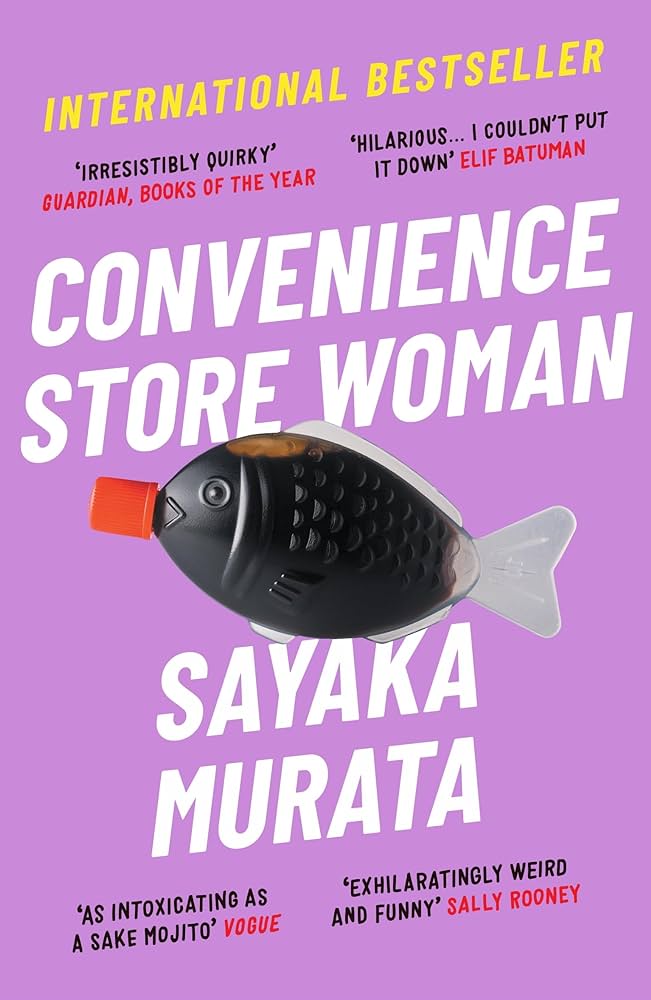You don’t have to walk far in Japan’s big cities to find the kind of “konbini” store described in the text Convenience Store Woman. They are as much a part of the urban landscape as the huge billboards, the vending machines, and the powerful neon lights that radiate everything in their path. Konbinis are everywhere and at the center of busy daily life.
When the audacious Sayaka Murata was a student at Tamagawa University, she began working part-time at one of these konbini convenience stores. It was thanks to this experience and the strangeness she feels towards some social conventions that she wrote Convenience Store Woman (Konbini Ningen), a funny and quirky novel about the role of women in modern Japanese society.
With this semi-autobiographical work, Sayaka Murata won Japan’s most prestigious literary prize, the Akutagawa in 2016, and was named Woman of the Year by the country’s Vogue magazine. Written in simple prose, the slim volume (about 150 pages in Japanese and 160 in English) has sold more than two million copies worldwide and has been translated into more than 25 languages.
Convenience Store Woman is not only the story of a very “peculiar” woman, it is a challenge to conventional ideas about what makes people happy.
The story

In Convenience Store Woman, we meet Keiko Furukura, a 36-year-old woman who has spent half her life working in a konbini, located in the Hiiromachi neighborhood in front of the station. Keiko says that, above all else, she is a convenience store worker, even “more than [she is] a person”.
Keiko Furukura does not belong to the group of women who marry and devote themselves to the household, but neither does she identify herself as an ambitious professional. Keiko, the eldest of two sisters, is much happier performing her routine tasks as a konbini employee than aspiring to marriage, motherhood, or a big executive position.
The protagonist of Convenience Store Woman is considered an unusual woman to the society around her. To be fair, Keiko has always been a bit of an outsider, someone who has never fit into the social mold. Not at school, not at university, not even in her own family. All her life she has tried to be what others expect of her, not because she thinks others are right, but to avoid fuss and controversy.
Since childhood, she has had difficulty connecting with people. In addition to being emotionally distant, Keiko fails to understand the unspoken and unwritten rules of social situations. Over time, she must learns to mimic other people’s behaviors in an attempt to camouflage herself and go unnoticed.
However, when at the age of 18 she starts working in a branch of “Smile Mart”, our protagonist finally finds satisfaction and self-esteem. The convenience store, unlike the rest of her life, provides her with a safe and predictable place, governed by an “impeccable manual” that dictates all job functions, phrases and gestures to be used with customers.
In this simple, rule-bound world, the main character understands the norms of social interaction for the first time and is able to perform effectively and even excel. Keiko learns to greet, anticipate customers’ needs, and fit in in a way she never would have imagined. In many ways, the store gives her the opportunity to feel like a cog in society.
Over the course of 18 years, Keiko Furukura sees colleagues come and go, exhausted by the monotony of stocking and restocking shelves. But, quirky Keiko enjoys the routine, and finds meaning and joy among the well-stocked aisles and hot food cabinets. It’s not hard to see that Keiko wholeheartedly loves her modest job and has no interest in quitting.
“When I can’t sleep, I think about the transparent glass box that is still stirring with life even in the darkness of the night. That pristine aquarium is still operating like clockwork…. When morning comes, once again I’m a convenience store worker, a cog in society. This is the only way I can be a normal person,” reflects the protagonist. This revealing passage highlights how the store has been able to tap into Keiko’s consciousness and transform it on a deeper level.
And the fact is, when Keiko Furukura puts on the uniform of the Convenience Store, she also puts on a social mask that allows her to connect more easily with others. The woman acknowledges that the store helps her “disguise herself as a normal person.”
The thing is, although Keiko is happy in her four working walls, those close to her, from family members to co-workers, are increasingly urging her to redirect her life. Concerned and invasive, they all ask her the same questions: Why has she never had a partner, does she plan to get married someday? If she is not interested in getting married, shouldn’t she have a better job?
While Keiko Furukura doesn’t care about getting married, having children or applying for a higher-level job, her loved ones seem abysmally baffled at her decisions and her way of being. It seems that everyone wants to see Keiko settle down and follow a conventional path, and they relentlessly urge her to find some sort of “cure” and normalize.
“People who are considered normal enjoy putting those who aren’t on trial, you know,” she says somewhat dejectedly.
The point is that for Keiko, life in the store is much better than in the outside world, where she doesn’t know how to behave “normally,” nor does she fit in.
With no prospects for career advancement or romantic fulfillment, society gives her no respite and harasses her for wanting something different.
“The normal world has no room for exceptions and always quietly eliminates foreign objects. Anyone who is lacking is disposed of. So that’s why I need to be cured,” she muses.
So, to take the pressure off herself once and for all, Keiko begins a fake romantic relationship with Shiraha, a misogynistic, lazy and abusive co-worker. Like Keiko, Shiraha longs to escape the homogenizing pressures of Japanese society.
Before long, Shiraha and Keiko live together in an asexual relationship in order to silence the intimidating voices around them. Keiko can pretend to be in a romantic relationship and thus avoid pity and constant scrutiny. For his part, Shiraha can hide from Japanese society’s cruel opinion of men without high aspirations. His only demand is that she allow him to live in her bathroom, feeding him like a pet.
As expected, things never go as smoothly or easily as our unlikely protagonists long for.
Convenience Store Woman is the story of a woman desperately struggling to find her role in society and feel accepted, even if it means sacrificing her own individuality. Through Keiko Furukura, author Sayaka Murata masterfully illustrates Japanese society’s treatment of women who refuse to conform to gender expectations. This book addresses ideas such as social masks, the pressure on single women to fulfill a traditional role, and the elusive and strained concept of a “normal” life.
Being very rare among the rare
Convenience Store Woman is a quick read, partly because it is a small book, but also because it makes you race through the pages to see what happens next.
This ingenious novel can be seen as an invitation to feel empathy and respect for the other, the one who does not conform to convention and who is constantly cornered into adapting to the expectations of the majority. In a way, the text asks us to look with the eyes of another, and to feel with the heart of another.
Between drama and humor, Sayaka Murata’s novel reads pleasantly, while urging us to rethink success and “normalcy.”
Image: Hreinn Gudlaugsson

